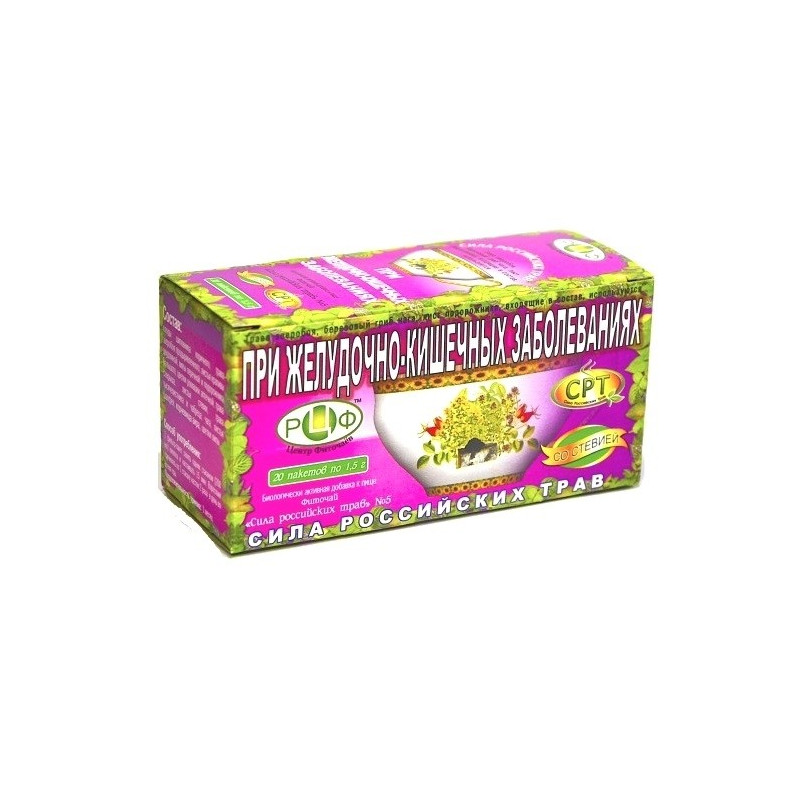



 All payments are encrypted via SSL
All payments are encrypted via SSL
 Full Refund if you haven't received your order
Full Refund if you haven't received your order
Herbal tea has antispasmodic, antibacterial and anti-inflammatory effect, improves the activity of the gastrointestinal tract, has a tonic property.
Cinnamon rose hips, St. John's wort herb, nettle leaves, peppermint and large plantain, camomile flowers, knotweed grass, stevia leaves, yarrow and thyme grass, chaga, sage leaves, calamus rhizome, linden flowers.
Herbal tea has antispasmodic, antibacterial and anti-inflammatory effect, improves the activity of the gastrointestinal tract, has a tonic property. The impact of the composition due to the unique ratio of parts, in the amount of being a necessary energy chord that neutralizes the cause of the gastrointestinal pathology. Restoration of the normal energy characteristics of the organism is accompanied by the elimination of pathological changes in the digestive system. In addition, each component of herbal tea separately is appropriate.
Rosehip renews tissues, heals damaged mucous membranes and ulcers, replenishes vitamin C deficiency
Hypericum improves the blood supply to the internal organs, has an astringent effect, improves the secretion of bile and normalizes the excretory function of the gastric glands, eliminates diarrhea, relieves pain. Powerful bacteriostatic, anti-inflammatory and antispasmodic.
Nettle improves fermentation, regulates the functional activity of the stomach and intestinal bacterial flora, acts as a choleretic and anti-inflammatory, enhances the processes of regeneration of mucous membranes, enhances the basal metabolism, stops vomiting.
Mint improves digestion, has antispasmodic and analgesic properties, strengthens intestinal motility, reduces fermentation processes, enhances the secretion of digestive glands, stimulates the choleretic effect of other plants, relieves nausea.
Plantain reduces inflammation, enhances the secretion of gastric juice, without altering its activity, acts as an anti-ulcer and laxative.
Chamomile It has anti-inflammatory and antispasmodic effects, increases bile secretion, reduces the formation of gases, relieves pain, stimulates regeneration processes.
Knotweed used in inflammation of the mucous membrane of the stomach and intestines, gastric ulcer and duodenal ulcer.
Stevia improves the gastrointestinal tract, improves immunity and the level of human bioenergetic abilities.
Yarrow increases the appetite, tones and regulates the metabolism, inhibits tumor formation, is effective in varicose veins of the esophagus, hypoacid gastritis, peptic ulcer, ulcerative spastic colitis.
Thyme disinfects the alimentary canal, relieves spasms, anti-rotten effect.
Chaga used in chronic gastritis, gastrointestinal dispensias with symptoms of atony, with gastric ulcer.
Sage - antimicrobial, anti-inflammatory, softening effect, enhances the secretion of gastric juice, removes toxic substances from the intestine, acts as a hemostatic and ulcerative.
Linden relieves pain during cramps in the stomach, increases bile formation and biliary excretion.
The combination of components in the proportion that is part of, enjoys the people deserved authority as a therapeutic herbal remedy and allows us to guarantee you complete success in the case of long-term and proper use. The composition of herbal tea included only edible, pleasant to the taste and healthy plants.
It is recommended as a biologically active food supplement, a source of flavonoids (including avicularin) containing hypericin, essential oils and a chromogenic complex.
filter packages single brew 1.5 g.
1 filter bag pour one glass (200 ml) of boiling water and infuse for 15 minutes.
adults take 1 glass of infusion 2 times a day with meals.
1 month.
individual intolerance to the components, pregnancy and breastfeeding. Do not allow concomitant use with drugs. Before use, it is recommended to consult a doctor.
Herbal tea number 5 is included in the menu of a diet that favors the prevention and cure of a person from diseases of the digestive system: acute gastritis; chronic hypo-and hyperacid gastritis; peptic ulcer and duodenal ulcer; chronic hepatitis and hepatocholangitis, chronic cholecystitis and cholangitis, biliary tract dyskinesia, gall-stone disease, chronic enteritis, colitis and enterocolitis, disorders of the chair.
